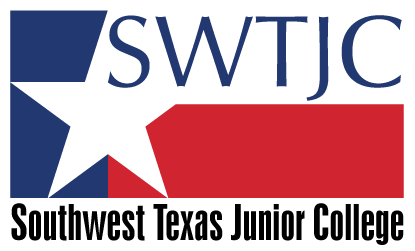2.8 Faculty
The number of full-time faculty members is adequate to support the mission of the institution and to ensure the quality and integrity of each of its academic programs.
Upon application for candidacy, an applicant institution demonstrates that it meets the comprehensive standard for faculty qualifications.
JUDGMENT: ![]() Compliant
Compliant
STATEMENT OF RATIONALE FOR JUDGMENT OF COMPLIANCE
Southwest Texas Junior College is a comprehensive community college with an 11-county service area consisting of 17,000 square miles. SWTJC employs full-time and adjunct faculty for their content/disciplinary expertise and training, their ability to engage students, and their capacity to support the College’s mission. In the Spring 2014 semester, SWTJC employed 132 full-time faculty and 106 part-time (adjunct) faculty. In the Fall 2014 semester, the College employed 136 full-time faculty and 116 part-time. The College’s unduplicated headcount in Spring 2014 was 5164 and in Fall 2014 was 5605, resulting in respective overall student/faculty ratios of 22:1 and 22:1.
Full-time faculty members are employed on 9-month contracts spanning the Fall and Spring semesters of an academic year. The SWTJC Faculty Handbook outlines the faculty’s professional obligations: Full-time faculty are expected to engage in College-related activities for at least 30 hours per week, with 15 of those hours spent teaching. The remaining 15 hours are taken up by office hours, class preparation activities, student advising, club sponsorship duties, institutional or community service, and professional development activities. College policy stipulates the number of overload classes a full-time instructor may teach and the approval process for authorizing those overloads.
Full-time faculty comprise the foundation of program development, quality, and integrity. Each academic year full-time faculty develop program/discipline Unit Action Plans (UAPs). These plans are focused on the improvement of one or more aspects of the curriculum in order to support the College mission. The faculty develop UAP goals, necessary interventions, assessment measures, and changes/improvements warranted in course(s) or programs by the assessment findings. Southwest Texas Junior College employs a faculty sufficient to plan, develop, teach, and evaluate all of its courses and programs, regardless of instructional delivery method. In the Spring 2014 semester, 82% of courses offered online were taught by full-time faculty; in the Fall 2014 semester, that percentage was 95%. It should be noted that all full-time SWTJC faculty teaching online also teach traditional face-to-face courses.
In addition, full-time faculty are the principal creators of Master Syllabi for all courses offered at SWTJC. Each master syllabus contains the student learning outcomes for the course, the foundational topics to be covered, the required instructional materials, and a range of student evaluation options (tests, quizzes, essays, presentations, e.g.).
Full-time faculty serve on various institutional committees that are charged with overseeing the curricular offerings of SWTJC. The Curriculum Committee is the College’s principal body for that oversight. Five full-time faculty members serve on this committee, as do the five Division Chairs, all of whom came from the full-time SWTJC faculty ranks and who maintain teaching duties. A recommending body to the College President, the Curriculum Committee offers initial approval to: curricular changes; policy changes and corrections; the College Catalog; and to the Faculty Handbook. The Committee also ensures the periodic review of College programs and curricula.
Faculty serve on a number of other committees charged with monitoring and evaluating aspects of the curriculum. For example, throughout 2013 the General Education Committee met to develop a revised General Education Core Curriculum based on State mandate. Other relevant committees are the Program Review Committee, the Distance Education Committee, and the Online Committee.
Full-time faculty in each Technical program organize and facilitate an annual Advisory Committee meeting. Advisory committee members are professionals from service-area businesses and industry who bring expertise and current perspectives on the knowledge, skills, and abilities SWTJC students need to acquire and develop in Technical programs. In addition, full-time technical faculty attend the annual Texas Industrial Vocational Association (TIVA) meeting to become apprised of current trends in their fields and to complete required professional development activities for re-certification in their disciplines.
Annual budget preparation also depends on the input of SWTJC’s full-time faculty. Each spring semester discipline/department faculty are asked to develop budgetary needs for the upcoming fiscal year. Faculty consider the resources needed to support the Department Unit Action Plan that supports the overall mission and strategic goals of the College. These resources include supplies, equipment, facilities, and professional development needs.
Please click on the following Table 2.8 link for access to a set of tables presenting the distribution of full-time and part-time faculty across programs, instructional sites, and various delivery modes. The student data included in the tables are based upon course enrollments, and are thus duplicated numbers. Likewise, many full-time faculty are qualified to teach in more than one subject area; therefore, the number of faculty is also a duplicate number.
Evidence
SWTJC Faculty Handbook, 2014, pp. 31-34
SWTJC Faculty Handbook, 2014, pp. 34-36
SWTJC Master Template Syllabi
SWTJC Faculty Handbook, 2014, p. 120
SWTJC General Education Committee Meeting, September 21, 2012
SWTJC Faculty Handbook, 2014, p. 123
SWTJC Faculty Handbook, 2014, p. 121
SWTJC Faculty Handbook, 2014, p. 127
SWTJC Advisory Committee Meeting, October 10, 2014
SWTJC Faculty Distribution


